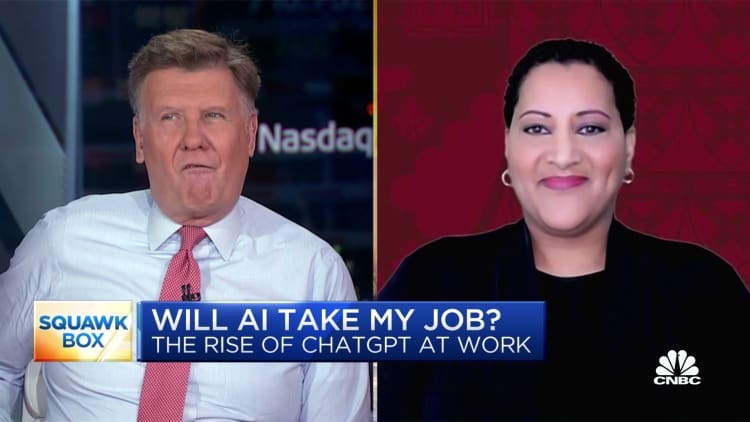Workers in Singapore are the world's fastest when it comes to adopting artificial intelligence skills, according to LinkedIn's latest Future of Work report.
The report, which drew data from 25 countries, found that Singapore has the highest "diffusion rate" — the share of members adding AI skills to their profiles grew 20 times from January 2016.
That's significantly higher than the global average of eight times, LinkedIn told CNBC Make It.
Finland (16x), Ireland (15x), India (14x), and Canada (13x) round out the top five countries with the highest rates of AI skills diffusion, according to the report.

Pooja Chhabria, career expert and Asia-Pacific head of editorial at LinkedIn, said Singapore has long been a "fertile ground" for AI disruption.
That's thanks to the country's "robust digital infrastructure, a strong framework for the protection of intellectual property, and a thriving ecosystem of venture capital firms, angel investors … that provide capital," she said.
"We have seen rapid growth in AI development and adoption fueled by startups and businesses over the years, in their efforts to carve out new niches or achieve greater competitive advantage."
Skills 'potentially augmentable' by AI
In 2022, the five fastest-growing AI-related skills added to member profiles were all ones "hinting at the emergence of generative AI," according to LinkedIn.
That includes skills such as question-answering — which grew a whopping 332% — classification and recommender systems.
Chatbot ChatGPT sparked a new wave of interest in generative AI (GAI) technologies in the past year, and Big Tech firms like Google and Microsoft have since looked to infuse AI across their business.
LinkedIn, which is owned by Microsoft, launched in May features that allow members to create AI-generated recruiter messages, job descriptions and user profiles.

However, generative AI's ability to create text, images and other content in response to human input — has sparked new fears of jobs being replaced by tech.
A Goldman Sachs report found 300 million jobs around the world could be affected by AI and automation, such as office and administrative support roles.
LinkedIn — which analyzed some of the most common occupations on the platform — found that 45% of teachers' skills, for example, are "potentially augmentable" by generative AI.
"New GAI tools present an opportunity to potentially lighten workloads and help professionals, like teachers, focus on the most important parts of their job," LinkedIn wrote.
AI will certainly change the way that many of us do our jobs, and the time we spend on tasks that potentially can be aided by generative AI.Pooja ChhabriaCareer expert, LinkedIn
According to the report, teaching skills that could be augmentable include lesson planning, curriculum development, literacy and tutoring.
However, 53% of teachers' skills still need to be performed by human beings, such as classroom management, elementary education and special education.
Share of skills potentially augmentable by generative AI
- Software engineer: 96%
- Customer service rep: 76%
- Cashier: 59%
- Salesperson: 59%
- Teacher: 45%
- Event manager: 39%
Just 3% of software engineers' skills need to be performed by humans.
"AI will certainly change the way that many of us do our jobs, and the time we spend on tasks that potentially can be aided by generative AI," Chhabria added.
"As a result, people skills … like creative thinking, leadership and communication, and ensuring ethical outcomes – are also becoming increasingly important."

She added that one of the key areas where software engineers can use their people skills is "communicating more effectively with business and non-technical audiences."
According to LinkedIn, jobs with the smallest share of potentially augmentable skills include oil field operator (1%), environmental health safety specialist (3%), nurse (6%) and medical doctor (7%).
'The human is always in control'
As AI begins to automate many areas of the workforce, soft skills are becoming increasingly important, LinkedIn said.
In the U.S. for example, the fastest-growing in-demand skills since November 2022 are flexibility, professional ethics, social perceptiveness and self-management, said the report.
Similarly, Microsoft's 2023 Work Trend Index report found that the three top skills that leaders believe are essential are analytical judgment, flexibility and emotional intelligence.

"The human is always in control and … with a generated AI response, you have a moment of, 'Do I want to keep this content? Do I want to modify it? Do I want to discard it?'" Colette Stallbaumer, the general manager for Microsoft 365 and "future of work" told CNBC Make It in May.
"You still have to use those judgment skills when thinking about when to use AI and making those calls — that's really where the human agency comes into it."
Emotional intelligence is also crucial in helping to "determine when to leverage an AI capacity instead of a human capability," Microsoft added.
Don't miss: Employees in Asia are spending the most time looking busy at work, says Slack report
Like this story? Subscribe to CNBC Make It on YouTube!

